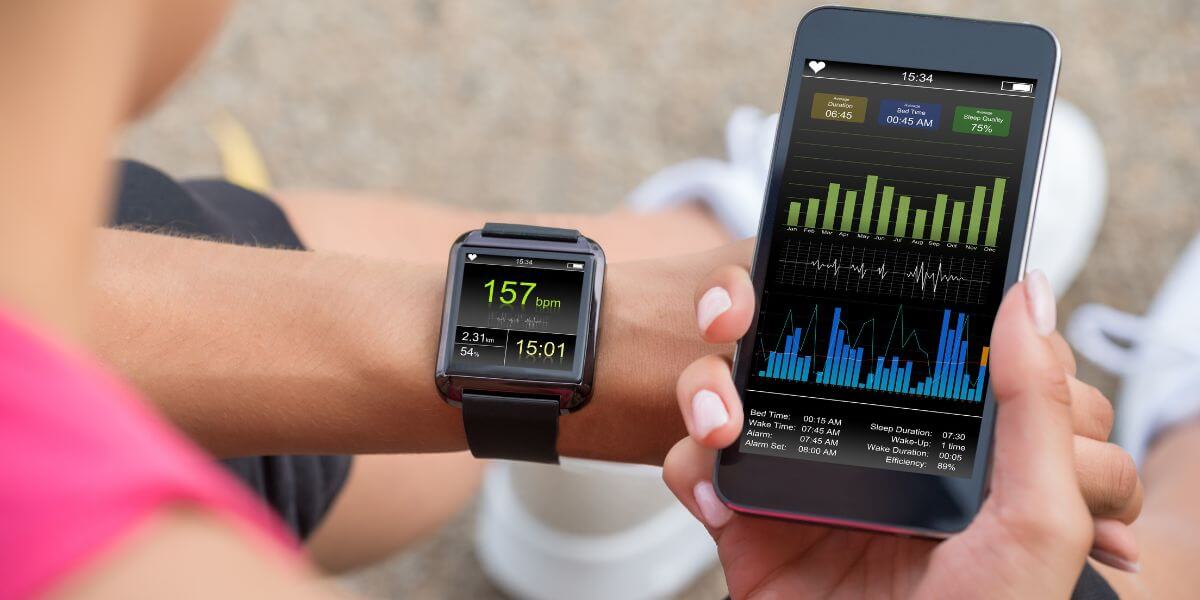Lower your internet bill
61% of people overpay for their internet.
Are you one of them?
Unlock exclusive offers in your area!
Call now
[tel]Enter zip code
1 Star is Poor & 5 Stars is Excellent.
* Required
Written by Sam Watanuki - Pub. Feb 18, 2025 / Updated Feb 21, 2025
Table of Contents
Are you happy with your Internet service?
About the author
Missing those daily step goals? Struggling to maintain consistent workout routines? Not sure if you’re getting enough quality sleep? The right fitness tracker does more than count steps—it becomes your personal health coach, workout companion, and wellness advisor all wrapped into one sleek device.
From advanced health monitoring to smart notifications, today’s fitness trackers do so much more than the original FitBit that started it all, offering unprecedented insights into your daily activities and overall wellness. Whether you’re a dedicated athlete or just starting your fitness journey, understanding the latest innovations in wearable technology can help you make an informed choice for your health goals.
Fitness trackers have evolved far beyond simple pedometers. Today’s devices combine sophisticated sensors, advanced algorithms, and smart features to provide comprehensive health monitoring. These wearables now track everything from basic activity metrics to advanced biometrics like blood oxygen levels, stress indicators, and sleep quality patterns.
The latest generation of fitness trackers incorporates AI-powered insights that transform raw data into actionable health recommendations. Many devices now include features previously found only in medical-grade equipment, such as ECG monitoring, irregular heart rhythm detection, and even skin temperature sensing. This evolution in future-tech makes them invaluable tools for both fitness enthusiasts and health-conscious individuals.
Premium fitness trackers are leading the way in wearable tech, packed with features for health tracking and advanced fitness tools. They combine smart sensors with powerful tech to give you detailed insights into your health and workouts. With built-in GPS, advanced heart rate monitoring, and automatic workout detection, these trackers are perfect for both serious athletes and anyone looking to stay on top of their fitness.
The exceptional battery life of premium models, often lasting up to 14 days with normal use [1], means less time charging and more time tracking. While these devices command higher prices, ranging from $200 to $400, their durability and extensive feature sets make them valuable investments for dedicated users.
Mid-range fitness trackers have also become increasingly sophisticated, offering an impressive balance of features and affordability—and, ultimately, not feeling like a “mid-tier" product. These devices typically include essential tracking capabilities like continuous heart rate monitoring, sleep analysis, and basic smart notifications. With water resistance ratings suitable for swimming and shower use, they provide practical durability for daily wear.
Priced between $100 and $200, these trackers appeal to users seeking reliable health monitoring without premium costs.
Entry-level fitness trackers continue to improve in capability while maintaining affordable price points. These devices focus on core features like step counting, basic heart rate monitoring, and sleep tracking. Many now include water resistance and smartphone notifications, making them practical for everyday use.
While they may lack advanced sensors or premium materials, still offer days of battery life and provide reliable activity monitoring. With prices under $100, they represent an excellent starting point for the fitness tracking-curious.

Choose a fitness tracker that’s right for you
When choosing a fitness tracker, it’s important to identify the features that best align with your lifestyle and health goals:
Fitness trackers offer various health monitoring features that go beyond basic activity tracking:
The core functionality of fitness trackers continues to evolve with even more sophisticated tracking capabilities:
Fitness trackers also now serve as extension of your smartphone, offering convenience beyond health monitoring:
When selecting a fitness tracker, consider your specific needs and lifestyle factors. The growing number of options means you can find a device that perfectly matches your health goals and daily routines without compromising on essential features.
Different activities demand different tracking capabilities. A casual walker needs different features than a triathlete or CrossFit enthusiast. Consider your primary activities:
Battery performance varies significantly among devices, affecting both functionality and convenience. Consider these factors:
Even the best technology becomes useless if it’s too complicated to use effectively. Look for:

Here’s our favorite fitness trackers in 2025
From advanced health sensors to impressive battery life, 2025’s fitness trackers offer more features and better performance than ever before. We’ve tested and compared the top models to help you find the perfect match for your lifestyle and budget.
Here are our favorite picks:
The Charge 6 represents Fitbit’s most sophisticated tracker to date. With built-in GPS, advanced heart monitoring, and integration with Google services, it delivers premium features without the bulk of a smartwatch. Regularly available at Amazon for $159.95 [6], it’s an excellent value for comprehensive health tracking.
Apple’s latest flagship watch continues to set the standard for smartwatch functionality. With its advanced health sensors, emergency features, and seamless iPhone integration, it’s the obvious choice for Apple users. While premium-priced at $399.00 [7], its extensive capabilities justify the investment.
At just $99.95 [8], the Inspire 3 proves you don’t need to spend a ton for quality health tracking. This slim device covers all the basics—steps, heart rate, sleep—while maintaining an impressive 10-day battery life.
When it comes to premium fitness trackers, these high-end options combine cutting-edge technology with sleek designs to offer an unparalleled user experience.
Priced at $249.99 [9], the Venu Sq 2 stands out with its multitude of functions, along with its battery life, lasting up to 11 days in smartwatch mode. Key features include:
Starting at $349.00 [10], the Oura Ring 4 reimagines fitness tracking in a sleek ring design. Perfect for those who prefer minimal wearables, it offers:
Mid-range fitness trackers strike the perfect balance between affordability and advanced features, making them an excellent choice for most users.
At $199 [11], the Lily 2 combines style with substance. Its features specifically cater to women’s health:
Priced at $159.99 [12], this watch excels at specialized tracking:
For those seeking reliable fitness tracking without breaking the bank, budget-friendly options provide essential features at an accessible price point.
At just $59.99 [13], the Galaxy Fit3 proves affordable doesn’t mean basic:
Starting at $249 [14], the SE offers core Apple Watch features at a lower price point:
At $79.95 [15], the Inspire 3 delivers Fitbit’s renowned tracking in a budget-friendly package:

Track your health and fitness with confidence
Selecting the right fitness tracker requires balancing features, budget, and personal needs. As these devices become more sophisticated, finding the perfect match means considering both immediate needs and future goals.
While premium features command higher prices, consider the long-term value:
Entry-level devices ($50-$100) offer essential tracking capabilities suitable for beginners or those focused on basic activity monitoring. Mid-range options ($100-$200) provide a sweet spot of features and reliability for most users. Premium devices ($200+) deliver advanced health insights and superior build quality for dedicated fitness enthusiasts.
Remember that the most expensive option isn’t always the best choice. Focus on features that align with your specific needs rather than paying for capabilities you may never use.
[1] Forbes. “I’m A Personal Trainer: These Are The Best Fitness Trackers I Tested."
[2] Cleveland Clinic. “Blood Oxygen Level."
[3] Reddit. “Smart Watches: Automatic activity tracking or only when a workout is selected?"
[4] Polycase. “Ultimate Guide to IP Water Resistance Ratings."
[5] SwimSwam. “SWOLF: What is it and How it Can Help You Swim Efficiently?"
[6] Amazon. “Fitbit Charge 6 Fitness Tracker."
[7] Apple. “Apple Watch Series 10.
[8] Amazon. “Fitbit Inspire 3."
[9] Garmin. “Garmin Venu Sq 2."
[10] Oura. “Oura Ring 4."
[11] Garmin. “Garmin Lily 2."
[12] Samsung. “Samsung Galaxy Watch FE."
[13] Samsung. “Samsung Galaxy Fit3."
[14] Apple. “Apple Watch SE."
About the author
Congratulations, you qualify for deals on internet plans.
Speak with our specialists to access all local discounts and limited time offers in your area.
[tel]61% of people overpay for their internet.
Are you one of them?
Unlock exclusive offers in your area!
Call now
[tel]Enter zip code